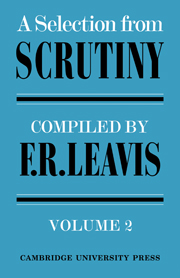5 - ON METAPHYSICAL POETRY
Published online by Cambridge University Press: 04 August 2010
Summary
In literary criticism the adjective metaphysical, like the noun metaphysics in philosophy, has had a busy life. It has assumed new meanings before casting off the old, and the separation of old from new is not at all easy. I believe that such a separation is nevertheless desirable: for, though we may not be saying much when we say that a poem is metaphysical, it is as well to know exactly (if we can) what the little is we are saying.
Hobbes in philosophy dismissed new meanings as merely nonsense: ‘the term signifieth as much as the books written, or placed after, Aristotle's Physics’. Such a proceeding, however tempting, is no longer possible; not, at any rate, in criticism. For nowadays, I think, there is felt to be about the adjective metaphysical a peculiar fitness for the description of a certain kind of poetry, of which the norm is Donne's; and, whatever this fitness may be, it is not to be discovered by an investigation of origins. It was perceived neither by Johnson when he popularized the adjective as a critical term nor by Dryden when he suggested it.
Johnson had little metaphysics, and much of what he called metaphysical poetry we should now immediately dispose of under other names. We shall glance at it later; here it need not delay us. Dryden, on the other hand, was more cultured, and noticed that in Donne metaphysical propositions are to be found.
- Type
- Chapter
- Information
- A Selection from Scrutiny , pp. 157 - 171Publisher: Cambridge University PressPrint publication year: 1968



